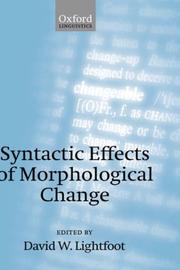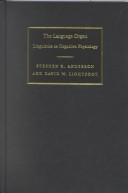| Listing 1 - 4 of 4 |
Sort by
|

ISBN: 0199250693 0199250685 0191719455 Year: 2006 Publisher: Oxford Oxford University Press
Abstract | Keywords | Export | Availability | Bookmark
 Loading...
Loading...Choose an application
- Reference Manager
- EndNote
- RefWorks (Direct export to RefWorks)
This book presents the latest thinking on the nature and causes of language change. The authors consider how far changes in morphology (e.g. inflectional word endings) cause changes in syntax (e.g. word order). They examine such phenomena from the perspective of current syntactic and psycholinguistic theory, in particular addressing the issues raised by the hypothesis that grammatical change is driven by how children acquire language.
Grammar --- Grammar, Comparative and general --- Comparative grammar --- Grammar, Philosophical --- Grammar, Universal --- Language and languages --- Philosophical grammar --- Linguistics --- Philology --- Morphosyntax --- Grammar, Comparative
Book
ISBN: 128339863X 9786613398635 3110218321 Year: 2009 Publisher: Berlin ; Boston : De Gruyter Mouton,
Abstract | Keywords | Export | Availability | Bookmark
 Loading...
Loading...Choose an application
- Reference Manager
- EndNote
- RefWorks (Direct export to RefWorks)
Noam Chomsky's first book on syntactic structures is one of the first serious attempts on the part of a linguist to construct within the tradition of scientific theory-construction a comprehensive theory of language which may be understood in the same sense that a chemical, biological theory is understood by experts in those fields. It is not a mere reorganization of the data into a new kind of library catalogue, nor another specualtive philosophy about the nature of man and language, but rather a rigorus explication of our intuitions about our language in terms of an overt axiom system, the t
Generative grammar. --- Grammar, Comparative and general --- Linguistics --- Language and languages --- Syntax --- Grammar, Generative --- Grammar, Transformational --- Grammar, Transformational generative --- Transformational generative grammar --- Transformational grammar --- Psycholinguistics --- Syntax. --- Research. --- Derivation --- Philology --- Grammar, Comparative and general Syntax
Book
ISBN: 9783110218329 Year: 2009 Publisher: Berlin Boston
Abstract | Keywords | Export | Availability | Bookmark
 Loading...
Loading...Choose an application
- Reference Manager
- EndNote
- RefWorks (Direct export to RefWorks)

ISBN: 0521007836 0521809940 1107132142 0511178050 0511042108 0511148585 0511305419 0511613865 128041944X 0511044917 9780511042102 9780521809948 9780521007832 9780511148583 9780511044915 9780511613869 9781280419447 9786610419449 6610419442 Year: 2002 Publisher: Cambridge Cambridge University Press
Abstract | Keywords | Export | Availability | Bookmark
 Loading...
Loading...Choose an application
- Reference Manager
- EndNote
- RefWorks (Direct export to RefWorks)
The Language Organ treats human language as the manifestation of a faculty of the mind, a mental organ whose nature is determined by human biology and whose functional properties should be explored just as physiology explores the functional properties of physical organs. It surveys the nature of the language faculty in its various aspects: the systems of sounds, words, and syntax, the development of language in the child and historically, and what is known about its relation to the brain. It discusses the kinds of work that can be carried out in these areas that will contribute to an understanding of the human language organ. This book will appeal to students and researchers in linguistics, and is written to be accessible to colleagues in other disciplines dealing with language as well as to readers with an interest in general science and the nature of the human mind.
Biolinguistics. --- Cognition. --- Biolinguistics --- Biolinguistique --- Biolinguïstiek --- Cognitie --- Cognition --- Linguistique [Bio] --- Linguïstiek [Bio] --- Psycholinguistics --- #KVHB:Taal --- #KVHB:Linguistiek --- #KVHB:Fonetiek --- #KVHB:Taalontwikkeling --- Psychology --- Biology --- Linguistics --- Arts and Humanities --- Language & Linguistics
| Listing 1 - 4 of 4 |
Sort by
|

 Search
Search Feedback
Feedback About UniCat
About UniCat  Help
Help News
News